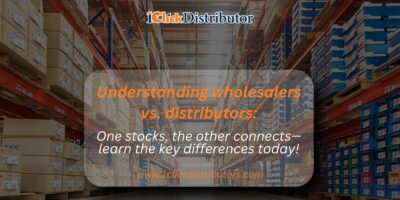Wholesalers vs Distributors : While operating a business, particularly one in manufacturing or retail, there are various people within the supply chain that play their part. Among the most commonly confused players are wholesalers and distributors. However, their respective roles, responsibilities, and influence among the supply chain are drastically different. This blog is elucidated based on the “Wholesalers vs Distributors: Understanding Key Differences” framework
In this article : Wholesalers vs Distributors , Main Responsibilities of Distributors , Benefits of Working with Wholesalers , Benefits of Working with Distributors , Key Challenges Faced by Wholesalers and Distributors , Choosing the Right Partner for Your Business , Key Functions of Wholesalers , What is a Wholesaler? .
The Significance of Supply Chain Clarity
A strong supply chain forms the basis of a global market. Whenever one sells electronics, apparel, or any consumer goods, understanding the wholesaler and distributor role is much needed for efficient operation. The varied intermediaries can prove to be the only way product availability, price control, or business scalability is ensured.
In this blog, we dived into Wholesalers vs Distributors: Understanding Key Differences, providing you with the necessary information for decision-making.
What is a Wholesaler?
Definition of a Wholesaler
A wholesaler is an organization that purchases products in large quantities directly from manufacturers and sells them in smaller quantities to retailers or other businesses. Wholesalers act as middlemen between manufacturers and retailers.
Key Functions of Wholesalers
- Bulk Purchasing: Wholesalers buy large quantities of goods, often at discounted rates.
- Warehousing: They store goods in warehouses, ensuring a steady supply to retailers.
- Resale: Wholesalers sell products to retailers in smaller quantities, so that the retailer can keep an inventory at reasonable levels.
- Case Study: The Impact of Wholesalers on Retail Growth
How Wholesalers Support Retail Expansion
Imagine a small retail shop dealing in household goods. With a wholesaler, it can stock almost all varieties without having to shell out huge sums of money in advance. The wholesale relationship will always ensure competitive prices and reliable supply, helping the retailer grow its customer base.
What is a Distributor?
A distributor is simply a supply chain intermediary that liaises closely with manufacturers to have their products taken to the market. Distributors usually differ from wholesalers because they normally act as exclusive partners of a manufacturer for only certain product lines to specific regions.
Main Responsibilities of Distributors
Product Representation : They are representative of the manufacturing company and also represent and market products.
Management of Logistics : They ensure there is timely supply of products directly to wholesalers, retailers, or any other end-customer.
Technical Support: Many distributors provide after-sales support, warranty management, and training.
Case Study: How Distributors Work with Manufacturers
A leading electronics manufacturer, for instance, relies on regional distributors to handle logistics, marketing, and customer support. This partnership allows the manufacturer to focus on innovation while the distributor ensures market reach.
Wholesalers vs Distributors : Understanding Key Differences
Core Functionality: Wholesalers vs Distributors
- Wholesalers: Focus on buying in bulk and selling to retailers.
- Distributors: Work directly with manufacturers to promote, distribute, and sometimes service products.
Product Sourcing and Inventory Management
- Wholesalers purchase large quantities of products to resell them in smaller batches.
- Distributors maintain a more specialized inventory, often with exclusive rights to sell specific products.
Target Audience: Retailers vs End Consumers
- Wholesalers: Serve retailers and other businesses.
- Distributors: May serve wholesalers, retailers, or even end consumers, depending on their agreements.
Benefits of Working with Wholesalers
Cost Efficiency and Bulk Discounts
Wholesalers often provide significant discounts on bulk purchases, enabling businesses to save money.
Inventory Flexibility
Retailers can buy smaller quantities from wholesalers, reducing the risk of overstocking.
Market Insights from Wholesalers
Because wholesalers deal with various retailers, they often have valuable market insights that can help businesses adapt to trends.
Benefits of Working with Distributors
Manufacturer Support and Product Expertise
Distributors often receive training and technical support directly from manufacturers, ensuring they are product experts.
Efficient Logistics and Delivery
Distributors typically have robust logistics networks, ensuring timely delivery.
After-Sales Service and Warranty Assistance
Distributors provide after-sales support, including handling warranties and repairs, adding value for end users.
Key Challenges Faced by Wholesalers and Distributors
Challenges in Supply Chain Coordination
Both wholesalers and distributors must navigate challenges like supply chain disruptions, fluctuating demand, and transportation delays.
Market Competition and Technology Disruption
With the rise of e-commerce, wholesalers and distributors face increasing competition and the need to adopt digital tools.
Final Comparison: Wholesalers vs Distributors
Tabular Analysis of the Key Differences
| Aspect | Wholesalers | Distributors |
| Primary Role | Bulk buying and reselling | Manufacturer representation |
| Inventory Focus | Broad and varied | Specialized and exclusive |
| Target Customers | Retailers | Wholesalers, retailers, consumers |
| Logistics | Limited | Extensive |
| After-Sales Support | No | Yes |
Choosing the Right Partner for Your Business
Your choice between wholesalers and distributors should align with your business model, target audience, and operational needs.
Check Our other articles
Conclusion
Understood differences between wholesalers and distributors can make a significant difference in the operations and profitability of your business. Be you a retailer looking for inventory flexibility or a manufacturer looking for some market representation, understanding the key differences between wholesalers and distributors can always help you make the right choice.
We have covered – Wholesalers vs Distributors , Main Responsibilities of Distributors , Benefits of Working with Wholesalers , Benefits of Working with Distributors , Key Challenges Faced by Wholesalers and Distributors , Choosing the Right Partner for Your Business , Key Functions of Wholesalers , What is a Wholesaler? .




One thought on “Wholesalers vs Distributors : Understanding Key Differences”